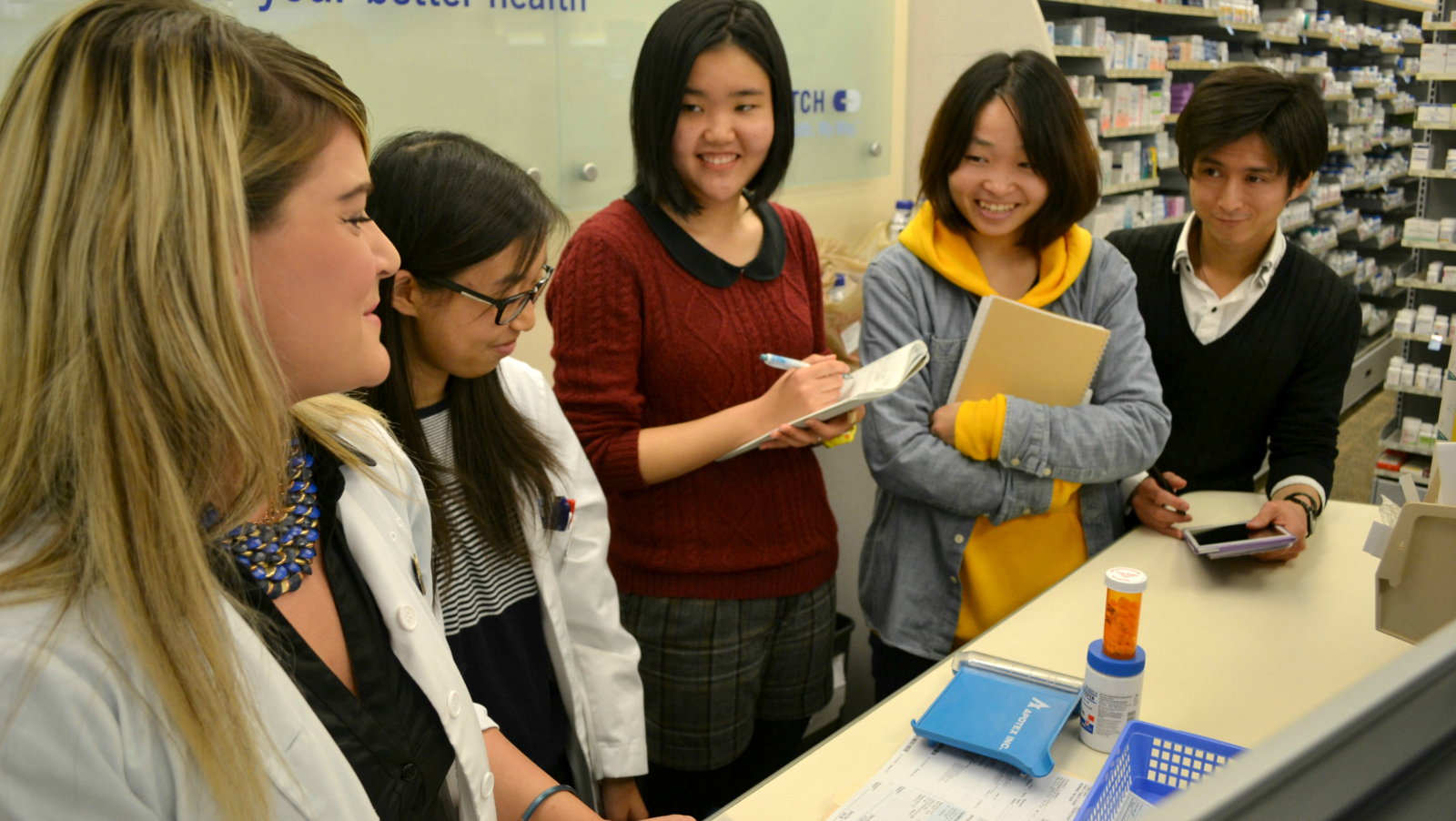
From left to right, Amanda Visscher (BSc Pharm '10), Shoppers Drug Mart pharmacist , Vivian Eng, fourth-year pharmacy student, and Japanese exchange students, Yuka Taguchi, Sachi Sunaga and Jun Ohya at Shoppers' Drug Mart. The exchange students visit local pharmacies as part of their exchange program education.
Yuka Taguchi gives high praise when she speaks about pharmacy education at the University of Alberta.
She should know. The Meiji Pharmaceutical University exchange student just spent eight weeks immersed in the faculty as part of an international student exchange program. She says University of Alberta pharmacy students have an advantage when it comes to the practical side of their degree.
"One of the biggest differences between our education and the Faculty of Pharmacy and Pharmaceutical Sciences is that students here get to interact with patients very early in their first and second year," says Taguchi, who is in her fifth year of pharmacy studies in Japan. "They are able to get more practice speaking to patients. In Japan, we don't interact with patients until our fourth year."
Taguchi, originally from Tokyo, says that difference is more a matter of culture than anything else but it's something she will mention to her classmates and faculty when she returns home. That is one of the tangible benefits of the program - to learn from each other and enrich the education experience for both sides.
Taguchi was one of eight students to take part in a yearly exchange program that lasts two months and has been running since 2010. The program is part of a memorandum of understanding between the faculty and Meiji Pharmaceutical University, a private university in North Tokyo. Meiji's pharmacy degree program is a six year degree - five years of pharmacy courses plus one year of general science courses.
Professor Cheryl Cox, who has been organizing the exchange program since 2010, says students learn both the pharmacy practice and education side of the profession.
"They have a very full schedule while they're here," says Cheryl Cox, professor, Faculty of Pharmacy and Pharmaceutical Sciences. "They are so eager to learn and they are so amazed at the practical learning that we do here in pharmacies and other health care settings. They learn both the pharmacy practice and learning side of the profession."
The exchange students spend three hours a day for three weeks in english language classes but most have a very good understanding of english before they even get here. They go to fourth-year lecture classes, take e-classes online, take part in case-study discussions, and visit pharmacies and primary care networks. They also visit Norquest College to learn how pharmacy technicians are integrated into a community pharmacy.
But, the exchange isn't just scholastic - they take part in cultural events as well. "We took them to a Golden Bears' hockey game and a dinner banquet before the game," says Cox. "They enjoyed that part of the visit." Faculty students also take the exchange students to other social events during their eight-week stay.
Cox says U of A pharmacy students have made a personal commitment to help the Japanese students and that makes the program a real success story.
Taguchi and fellow classmate Sachi Sunaga, from Chiba City near Tokyo, also noticed Canadian patients are more involved in knowing more about what illness they have before taking any medication. She says this difference can be seen through the education pharmacy students get.
"Pharmacy students take part in more case studies, more clinical work and are more integrated into the whole patient-health care provider relationship," says Sunaga. "In Japan, the disease and the treatment of the disease are more separate in the health care system."
Another big difference is how much Alberta pharmacists are able to do in their role as health care providers. In Japan, only physicians can prescribe medications while Alberta pharmacists are able to write prescriptions as part of their scope of practice.
Before returning to Japan, the two students will spend time as tourists visiting eastern Canada and the US.
Once they graduate, both Taguchi and Sunaga say this exchange experience has left them with a taste of international practice they definitely want to continue pursuing. "We have hospitals in Tokyo that cater to international patients, so I would like to work with more patients from all over the world," says Taguchi.